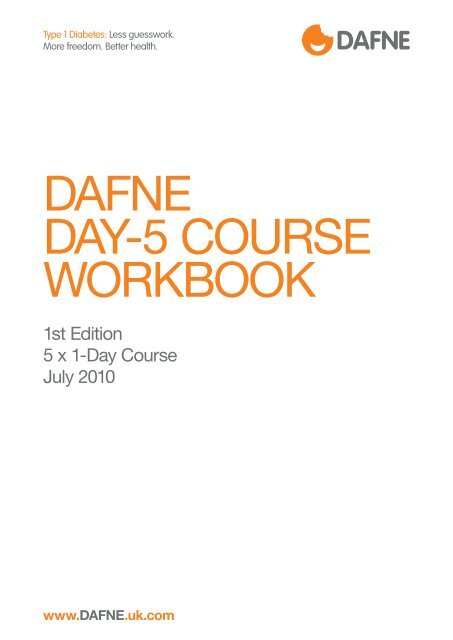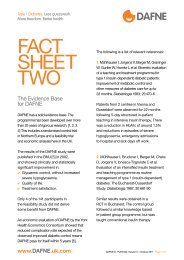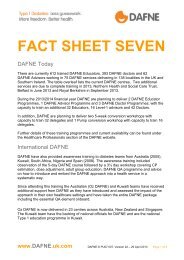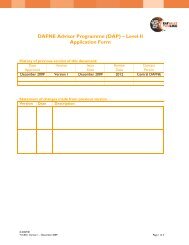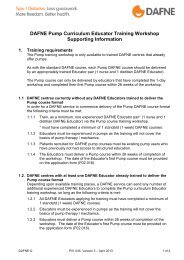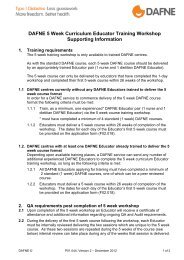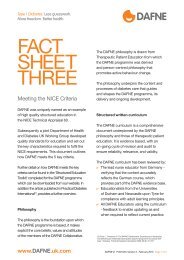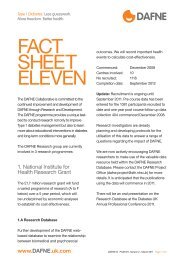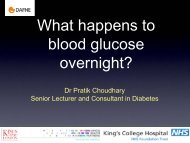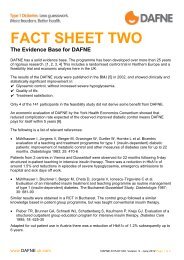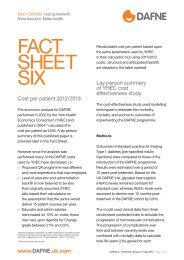FOR SHARON DAFNE wkbk day5 FINAL crops.pdf - Dafne - UK.COM
FOR SHARON DAFNE wkbk day5 FINAL crops.pdf - Dafne - UK.COM
FOR SHARON DAFNE wkbk day5 FINAL crops.pdf - Dafne - UK.COM
You also want an ePaper? Increase the reach of your titles
YUMPU automatically turns print PDFs into web optimized ePapers that Google loves.
<strong>DAFNE</strong><br />
DAY-5 COURSE<br />
WORKBOOK<br />
1st Edition<br />
5 x 1-Day Course<br />
July 2010<br />
www.<strong>DAFNE</strong>.uk.com<br />
<strong>DAFNE</strong> <strong>wkbk</strong> <strong>day5</strong>.indd 1 06/08/2010 13:23
First published 1999<br />
© <strong>DAFNE</strong> Copyright 2008<br />
This is a <strong>DAFNE</strong> copyrighted publication. This publication may not be reused, reproduced, republished, stored or<br />
transmitted, in any form or by any means, without the prior permission in writing of the publishers.<br />
Published by:<br />
The <strong>DAFNE</strong> Programme<br />
National <strong>DAFNE</strong> Office<br />
Diabetes Resource Centre<br />
North Tyneside General Hospital<br />
Rake Lane<br />
North Shields<br />
NE29 8NH<br />
The <strong>DAFNE</strong> Programme - hosted by Northumbria Healthcare Foundation Trust.<br />
Disclaimer<br />
The <strong>DAFNE</strong> Course Workbook was developed with the sole purpose of providing supporting material to<br />
accompany information given to individuals completing a 5 x 1-day <strong>DAFNE</strong> structured education course. These 5<br />
x 1-day courses are delivered by appropriately trained and certified <strong>DAFNE</strong> Educators.<br />
The <strong>DAFNE</strong> Course Workbook is not a stand-alone information source and should not be used by any individual<br />
who has not completed a 5 x 1-day <strong>DAFNE</strong> course or for any other purpose than that for which it was developed.<br />
The <strong>DAFNE</strong> Course Workbook is not intended to provide or replace any personal medical advice provided by a<br />
healthcare professional.<br />
The <strong>DAFNE</strong> Programme assumes no responsibility or liability for any injury, loss, damage or expense that may be<br />
caused by any action, or lack of action, that may be taken as a result of reading the <strong>DAFNE</strong> Course Workbook.<br />
<strong>DAFNE</strong> © T13.010, Version 1 - July 2010<br />
2<br />
<strong>DAFNE</strong> <strong>wkbk</strong> <strong>day5</strong>.indd 2 06/08/2010 13:23
Introduction<br />
Most people with Type 1 diabetes in the United Kingdom inject their insulin between two and four times a day.<br />
They try to adjust their doses of insulin according to their blood glucose level and to suit their lifestyle.<br />
The <strong>DAFNE</strong> training programme is designed to make it possible for you to have a much greater choice with food.<br />
<strong>DAFNE</strong> will enable you to eat largely as you want, while still keeping your blood glucose levels under control.<br />
<strong>DAFNE</strong> provides you with the skills necessary to estimate the amount of carbohydrate in each meal and to inject<br />
the right dose of insulin.<br />
This Workbook provides information to support the training you will receive during the 5 x 1-day <strong>DAFNE</strong><br />
course.<br />
Our aim is to help you to lead as normal a life as possible, while controlling your blood glucose levels, hence<br />
reducing the risk of long-term complications related to diabetes.<br />
3<br />
<strong>DAFNE</strong> <strong>wkbk</strong> <strong>day5</strong>.indd 3 06/08/2010 13:23
Contents - Day 5<br />
Introduction 3<br />
<strong>DAFNE</strong> 5 week course plan 5<br />
HbA 1c<br />
(Glycated Haemoglobin) 6<br />
How old HbA 1c<br />
s and new HbA 1c<br />
s relate 6<br />
Changeover in reporting of results 7<br />
Diabetes control and complications trial (DCCT) 7<br />
Annual Review 8<br />
Eyes 8<br />
Kidneys 8<br />
Nerves/Feet 9<br />
Blood pressure 9<br />
Blood fats (Lipids) 10<br />
Smoking 10<br />
Weight 10<br />
Footcare 11<br />
My personal questions for the doctor 11<br />
Travel 12<br />
Different time zones 12<br />
Pregnancy 13<br />
Contraception 13<br />
Goal Setting and Personal Action Planning 14<br />
<strong>DAFNE</strong> User Group 15<br />
What is the <strong>DAFNE</strong> User Group? 15<br />
Who can join the <strong>DAFNE</strong> User Group? 15<br />
Why have a User Group? 15<br />
Why should I join the User Group? 16<br />
How do I join the User Group? 16<br />
Who will have access to my contact details? 16<br />
How often will I be contacted? 17<br />
Will I have to attend meetings? 17<br />
What happens if I decide to stop being part of the User Group? 18<br />
<strong>DAFNE</strong> Online 19<br />
What is dafneonline? 19<br />
How do I get access to dafneonline? 19<br />
<strong>DAFNE</strong> User Group Application Form 20<br />
Day 5 notes 21<br />
4<br />
<strong>DAFNE</strong> <strong>wkbk</strong> <strong>day5</strong>.indd 4 06/08/2010 13:23
<strong>DAFNE</strong> 5 Week Course Plan<br />
Day 1 Day 2 Day 3 Day 4 Day 5<br />
Welcome & Introductions<br />
Course Plan (Timetable)<br />
Goal Setting<br />
<strong>DAFNE</strong> Quiz<br />
Review Carbohydrate<br />
Counting & Monitoring:<br />
Discussion of BG Diaries,<br />
Goals and Action Plans<br />
Recap & Review<br />
Carbohydrate Counting &<br />
Dose Adjustment:<br />
Discussion of BG Diaries,<br />
Goals & Action Plans<br />
Recap & Review<br />
Carbohydrate Counting &<br />
Dose Adjustment:<br />
Discussion of BG Diaries,<br />
Goals & Action Plans<br />
Recap & Review<br />
Carbohydrate Counting &<br />
Dose Adjustment:<br />
Discussion of BG Diaries,<br />
Goals & Action Plans<br />
What is Diabetes?<br />
Insulin: Types, Actions,<br />
<strong>DAFNE</strong> Regimen, Insulin<br />
Pump, Target BG Levels<br />
Purpose of Monitoring BG:<br />
Control & Targets<br />
Ketoacidosis and<br />
Ketone Testing<br />
HbA1c, DCCT, Annual<br />
Review & Questions for the<br />
Doctor<br />
Introduction to CHO,<br />
Glycaemic Index,<br />
Hypo Treatment<br />
Carbohydrate Portions<br />
Food Diaries<br />
Lunchtime Session<br />
Eating Out, Alcohol, Recipes<br />
and Sweeteners<br />
Sick Day Rules<br />
Social Aspects:<br />
Travel, Driving,<br />
Employment,<br />
Pregnancy<br />
Lunchtime Session Hypos: Causes & Treatment Lunchtime Session Lunchtime Session Lunchtime Session<br />
Reading Food Labels,<br />
Weighing and measuring<br />
CHOs &<br />
Difficult CHOs Workshop<br />
Theory of Insulin Dose<br />
Adjustment:<br />
Reduction, Escalation &<br />
Corrections<br />
Physical Activity & Exercise<br />
Healthy Eating & Weight<br />
Management<br />
Personal Goals & Action Plans<br />
Self Monitoring & Meter QC<br />
<strong>DAFNE</strong> Diary<br />
Injection Technique<br />
Changes to insulin regimen<br />
Snacking<br />
Diary Keeping<br />
Hypos (Minor & Severe)<br />
& Driving<br />
Theory of Goal Setting<br />
& Personal Action Plans.<br />
<strong>DAFNE</strong> Quiz<br />
Follow-up & Evaluation<br />
<strong>Dafne</strong>online<br />
<strong>DAFNE</strong> User Group<br />
What’s on Next Week?<br />
Action planning<br />
What’s on Next Week?<br />
Action planning<br />
What’s on Next Week?<br />
Action planning<br />
What’s on Next Week?<br />
5<br />
<strong>DAFNE</strong> <strong>wkbk</strong> <strong>day5</strong>.indd 5 06/08/2010 13:23
HbA 1c<br />
(Glycated Haemoglobin)<br />
Glucose sticks to the red blood cells and tissues of the body. The higher the blood glucose level, the greater the<br />
amount of glucose attaches to the blood cells and tissues. The more glucose that is attached, the greater the risk<br />
of diabetes related complications.<br />
HbA 1c<br />
measures the amount of glucose that has ‘stuck’ to the haemoglobin (part of the red cells in your blood<br />
stream) over the past 8-12 weeks. It is therefore a guide to the amount of glucose that has stuck to other<br />
parts of the body such as your eyes, kidneys, nerves and blood vessels. These are the areas where diabetes<br />
complications can occur.<br />
Therefore your HbA 1c<br />
result gives you an idea of your risk of developing complications from your<br />
diabetes; the higher the number, the greater your risks.<br />
Over the years HbA 1c<br />
has been reported as a percentage (%), in other words what % of the haemoglobin has<br />
glucose stuck to it. A new and more specific method of measuring HbA 1c<br />
has been developed that has a number<br />
of benefits in that it is more accurate in certain cultural groups and can be standardised across laboratories<br />
internationally. In future your HbA 1c<br />
will be reported in mmol/mol.<br />
The normal range for HbA 1c<br />
in someone without diabetes is less than 42 mmol/mol (6.0%)<br />
We believe that the best HbA 1c<br />
level for people with diabetes is between 45 mmol/mol – 55 mmol/mol<br />
(approximately 6.0% - 7.0%). At this level long-term complications may be prevented, while at the same<br />
time avoiding severe hypoglycaemia. Below this level, there may be a higher risk of having a bad hypo, as the<br />
body’s defences to hypoglycaemia may be impaired. Above this level there is an increased risk of developing<br />
complications of the small blood vessels. Before conception and during pregnancy however, the HbA 1c<br />
result may<br />
need to be even closer to the non-diabetic range, to give maximum benefit to the unborn child.<br />
How Old HbA 1c<br />
s and New HbA 1c<br />
s relate<br />
A guide to the new values expressed as mmol/mol is:<br />
HbA 1c<br />
as a %<br />
HbA 1c<br />
mmol/mol<br />
“New”<br />
6.0 42<br />
7.0 53<br />
8.0 64<br />
9.0 75<br />
10.0 86<br />
11.0 97<br />
12.0 108<br />
The fact that the number is higher now does not mean there is more glucose in your blood. It is just a different<br />
way of expressing the old numbers.<br />
6<br />
<strong>DAFNE</strong> <strong>wkbk</strong> <strong>day5</strong>.indd 6 06/08/2010 13:23
Changeover in reporting of results<br />
The new units for HbA 1c<br />
are obviously very different. Until 31 May 2011 HbA 1c<br />
results will be given as both % and<br />
mmol/mol to give everyone time to become familiar with the new units, and how they relate to the current figures<br />
and after that the figures will only be given in mmol/mol.<br />
Blood Glucose Range<br />
HbA 1c<br />
Result<br />
% mmol/mol<br />
Under 7 mmol/l (non-diabetic) Less than 6.0 Less than 42<br />
Mostly under 10 mmol/l 6.0 42<br />
7.0 53<br />
Frequently over 10 mmol/l 8.0 64<br />
9.0 75<br />
10.0 86<br />
11.0 97<br />
12.0 108<br />
Mostly over 17 mmol/l Over 13 Over 119<br />
Table 2: Correlation between blood glucose range and HbA 1c<br />
result<br />
Diabetes Control and Complications Trial (DCCT)<br />
A large American research study called the “The Diabetes Control and Complications Trial” (DCCT), published<br />
in 1993, showed that maintaining good blood glucose levels delayed the onset of damage to the small blood<br />
vessels in the eyes, kidneys and nerves (micro-vascular complications) in people with Type 1 diabetes. There are<br />
no additional benefits of having an HbA 1c<br />
level, which is too low (below 45 mmol/mol or 6.0%) as this has been<br />
found to increase the risk of severe hypos. We therefore recommend a target range of 45 mmol/mol - 55 mmol/<br />
mol (6.0% to 7.0%). In order to check your own progress, it is worth getting your HbA 1c<br />
measured every 3 months<br />
or so.<br />
7<br />
<strong>DAFNE</strong> <strong>wkbk</strong> <strong>day5</strong>.indd 7 06/08/2010 13:23
Annual Review<br />
Regular follow-up at your diabetes clinic (at least once a year) is essential. Not only do these clinics detect any<br />
problems related to your diabetes and allow treatment to begin but, more importantly, they may prevent them<br />
occurring.<br />
This section outlines the main things that should be checked at your clinic at least annually, explaining why they<br />
need to be checked and what may be done if any problems are detected.<br />
Eyes<br />
It is important that you have your eyes examined by a doctor or optician at least once a year. This is done by<br />
having eye drops put into your eyes which dilates your pupils so that the back of your eye can be seen using a<br />
torch-like instrument called an ‘ophthalmoscope’. More often now this is done using a special camera that can<br />
take a photograph of the inside of the eye.<br />
Poorly controlled diabetes increases the risk of damage to the blood vessels in the eye. This is called diabetic<br />
retinopathy. Permanent damage can occur if there is untreated bleeding from these vessels. In the early<br />
stages you may not be aware of these problems. Retinopathy can be treated by specialist eye doctors<br />
(ophthalmologists) using laser therapy. Attending for your annual eye check could therefore save your sight.<br />
Kidneys<br />
Once a year, you will be asked to bring a urine sample to your clinic visit to check for protein. Ideally, this sample<br />
will be the first urine you pass in the morning. You will also have a blood sample taken to be tested for ‘salts’ and<br />
‘waste products’ such as ‘creatinine’, which your kidneys should normally filter out of your blood into your urine.<br />
A blood test known as the estimated glomerular filtration rate (eGFR) may also be carried out.<br />
Having poorly controlled diabetes may increase the risk of damage to the small blood vessels in the kidneys.<br />
This is called diabetic nephropathy. The first sign of diabetic nephropathy is the presence of a small amount<br />
of protein in the urine. This is called microalbuminuria. If you have signs of microalbuminuria, your doctor may<br />
prescribe a tablet known as an ‘ACE Inhibitor’ (eg Ramipril, Perindopril, Captopril, Enalapril) as these have been<br />
found to prevent nephropathy getting worse. If untreated, nephropathy can eventually lead to kidney failure.<br />
8<br />
<strong>DAFNE</strong> <strong>wkbk</strong> <strong>day5</strong>.indd 8 06/08/2010 13:23
Nerves/Feet<br />
At your diabetes clinic your feet will be examined by the doctor, nurse or chiropodist. As well as having the<br />
general condition of the skin and nails on your feet checked, your nerves will also be tested using a tuning fork,<br />
nylon ‘monofilament’ or vibration meter.<br />
Diabetic neuropathy is the name given to nerve damage resulting from diabetic microvascular disease. The<br />
risk of neuropathy is increased by poor diabetes control. Neuropathy particularly affects the feet. The symptoms<br />
of this include altered sensation, numbness or pain in your feet. If you think you may have neuropathy (or some<br />
of the symptoms), contact your doctor or chiropodist so that your feet can be checked and regular chiropody<br />
treatment started if required.<br />
Neuropathy also may affect male sexual function causing impotence. If you experience any problems with<br />
erections or sexual function, mention it to your doctor or nurse as there are medications and advice that can help.<br />
Blood Pressure<br />
It is important that your blood pressure remains close to normal levels, ie 130/80 or lower. High blood pressure<br />
(hypertension) can also affect your kidneys and eyes leading to further damage. If your blood pressure is high,<br />
your blood vessels are under increased pressure. If left untreated over a long period of time, it can also lead to<br />
damage to the heart and large blood vessels, increasing your chances of heart attack or stroke.<br />
My Blood Pressure Reading:<br />
mmHg<br />
If your blood pressure is too high, you may be prescribed tablets and given dietary advice to help lower it.<br />
There are many different types of blood pressure lowering tablets that may be used, but one type, called ‘ACE<br />
inhibitors’ (eg Ramipril, Perindopril, Captopril, Enalapril), seem to be particularly useful in protecting the kidneys<br />
and heart.<br />
By lowering your salt intake in your diet you may help to reduce your blood pressure. You can lower your salt<br />
intake by:<br />
✔✔Not eating too many salty snacks eg crisps and nuts<br />
✔✔Not adding salt to your cooking eg use herbs and spices to flavour food<br />
✔✔Avoid adding salt to your food at the table<br />
You can also help to reduce your blood pressure if you:<br />
✔✔Increase your levels of physical activity<br />
✔✔Lose some weight (if you are overweight)<br />
✔✔Stop smoking (if you smoke)<br />
✔✔Cut down on alcohol intake<br />
9<br />
<strong>DAFNE</strong> <strong>wkbk</strong> <strong>day5</strong>.indd 9 06/08/2010 13:23
Blood Fats (Lipids)<br />
Blood is taken to test the level of fats (lipids). Occasionally your doctor may ask you to attend clinic ‘fasting’ for<br />
this particular test.<br />
Arteriosclerosis (hardening of the arteries) can also occur in people with Type 1 diabetes. The level of fats in a<br />
‘fasting’ sample of your blood gives an indication of your risk for developing arteriosclerosis and heart disease.<br />
Normal ranges for lipids:<br />
Total Cholesterol<br />
below 5 mmol/l<br />
High Density Lipoprotein (HDL) over 1.1 mmol/l<br />
Low Density Lipoprotein (LDL) below 3 mmol/l<br />
Triglycerides<br />
below 2.3 mmol/l<br />
Total cholesterol / HDL ratio below 4<br />
My results:<br />
HDL has a protective effect, while LDL and Triglycerides have a damaging effect and may increase your risk of<br />
developing heart disease. Your lipid levels can sometimes be raised due to genetic (inherited) reasons. However,<br />
making different food choices can help. Physical activity can also increase HDL levels as well as promote a<br />
healthy body weight, which also has a beneficial effect of the heart.<br />
Food choices should include:<br />
✔✔One portion of oily fish per week (salmon, mackerel, herring, kippers and sardines)<br />
✔✔At least 5 portions of fruit and vegetables per day<br />
✔✔Monounsaturated fat (eg olive oil, rapeseed oil) instead of saturated fat<br />
(eg butter, biscuits, cakes, pastry, cheese and fatty meat)<br />
Medication, such as ‘statins’ (eg Simvastatin, Atorvastatin) or ‘fibrates’, may be prescribed by your doctor, you<br />
can discuss this with your diabetes team.<br />
Smoking<br />
Your doctor or nurse should, as part of your annual review, ask you if you smoke.<br />
Smoking can have a damaging affect on the blood vessels. It is even more important for someone with diabetes<br />
to give up smoking than for someone without diabetes, because smoking further increases the risk of poor<br />
circulation. There are many ways to do this including nicotine replacement, tablets and self-help groups that<br />
can make it easier to quit. If you would like further information about quitting smoking, you can speak to your<br />
pharmacist, GP, practice nurse or a member of your diabetes team.<br />
Weight<br />
Your weight (and height) will be checked at your diabetes clinic appointment.<br />
Maintaining a healthy weight for your height is important in reducing your risks of developing heart disease and<br />
some types of cancers. Your dietitian will be able to offer further advice if required.<br />
10<br />
<strong>DAFNE</strong> <strong>wkbk</strong> <strong>day5</strong>.indd 10 06/08/2010 13:23
Footcare<br />
You may have heard of people with diabetes having problems with their feet. Understanding basic foot care will<br />
help to reduce the risk of long-term problems.<br />
The blood supply and sensation in your feet need to be checked every year as part of your annual review. The<br />
main problems are numbness or loss of sensation and/or poor circulation of the blood to your feet. If these<br />
are not recognised this could lead to you injuring your foot without realising it and poor wound healing with an<br />
increased risk of infection.<br />
The following are recommended as good foot care practise:<br />
✔✔Check your feet daily, making sure the skin is not sore or broken<br />
✔✔Use a moisturiser on dry skin and keep your feet clean by washing and drying daily<br />
✔✔Wear well-fitting shoes<br />
✔✔Cut your nails to the shape of the toe (not straight across), and file any rough edges<br />
✔✔If you smoke you should try to stop as smoking increases the risk of poor circulation, particularly to your feet<br />
If you have been told that you have neuropathy (loss of sensation), this means you could injure your feet without<br />
feeling any discomfort. It is important not to go barefoot or walk on any very hot or very cold surface, eg a hot<br />
beach, radiators, hot water bottles, hot bath water or hot bath taps, without protection.<br />
If you have any problems, it is important that you contact your GP or make an appointment with a chiropodist/<br />
podiatrist.<br />
My Personal Questions for the Doctor<br />
11<br />
<strong>DAFNE</strong> <strong>wkbk</strong> <strong>day5</strong>.indd 11 06/08/2010 13:23
Travel<br />
When planning to travel you will need to consider the extra supplies that you may need and the timing of your trip.<br />
This is especially important if you are passing through different time zones. The following will be useful:<br />
✔✔Make sure you have medical travel insurance and that your diabetes is covered on this policy<br />
✔✔If possible, be aware of local medical facilities<br />
✔✔Check if special vaccinations are necessary – these are available through your GP<br />
✔✔Check before you go that U100 insulin is available in that country<br />
Always carry with you:<br />
✔✔Adequate supplies of insulin and syringes or pen needles<br />
✔✔A spare pen-injection device (if you use these)<br />
✔✔Blood testing equipment<br />
✔✔Glucagon kit<br />
✔✔Ketone testing strips<br />
✔✔Safe clip (for safe disposal of needles)<br />
✔✔Rapid acting carbohydrate in case of hypos (glucose tablets or jelly<br />
sweets are ideal if there are restrictions on carrying fluids)<br />
✔✔Medicine for minor illness, and for travel sickness if required<br />
✔✔Identification, ie card or jewellery<br />
✔✔Extra food in case of delays<br />
During travel, keep your insulin around room temperature or just below, but above freezing point. It is<br />
recommended that you carry insulin in your hand luggage, as it can freeze in the hold of an aircraft.<br />
Tip: Give a small supply of insulin and a syringe / pen-injector to someone you are travelling with, in case your<br />
luggage is lost.<br />
Different Time Zones<br />
When travelling east to west your day will be lengthened. If there is a difference of several hours, you will probably<br />
eat at least one extra meal and this will require extra quick-acting insulin. Take your long-acting insulin at your<br />
destination as normal.<br />
When travelling west to east your day will be shortened. Consider the time between doses of background insulin<br />
to avoid any excessive overlap.<br />
12<br />
<strong>DAFNE</strong> <strong>wkbk</strong> <strong>day5</strong>.indd 12 06/08/2010 13:23
Pregnancy<br />
Women with diabetes can have children. However, medical evidence shows an increased risk of complications<br />
for mother and baby when the mother has diabetes. Evidence also shows that this risk is minimised by<br />
normalising blood glucose levels before conception and throughout the pregnancy. You can continue to use<br />
your <strong>DAFNE</strong> skills throughout pregnancy; in fact most women have found pregnancy and the insulin adjustments<br />
much easier to manage following <strong>DAFNE</strong>.<br />
Planning a pregnancy will help reduce the risk of problems. Continue to use a reliable form of contraception<br />
(see below) until you have got your HbA 1c<br />
as good as possible, i.e. 45 - 55 mmol/mol (6%-7%). Folic Acid is<br />
recommended for all women planning pregnancy – see your GP for a prescription and start this as soon as<br />
possible (you should continue taking this until 12 weeks into pregnancy).<br />
The normal level of HbA 1c<br />
is lower during pregnancy so women are encouraged to try to get their HbA 1c<br />
below<br />
55 mmol/mol (7%) if possible. During pregnancy is one of the few times you would be advised to test your blood<br />
glucose level in between meals. The target levels during pregnancy are:<br />
✔✔3.5 - 5.9 mmol/l before meals.<br />
✔✔Less than 7.8 mmol/l 1 (or 2) hours after meals / before bed.<br />
Blood glucose levels and insulin requirements change significantly during the stages of pregnancy. Most<br />
commonly, during the first few weeks you may experience more frequent hypoglycaemia, sometimes with a<br />
reduction in symptoms, or even severe hypos therefore it is useful for your partner to know how to help you to<br />
treat your hypos (see Day 3 Workbook). You may also need to be more cautious about driving and test/record<br />
your blood glucose level before getting in the car to drive. You may be advised to avoid driving temporarily if you<br />
have lost your hypo warnings.<br />
In the later stages of pregnancy (from around 26 weeks), insulin requirements usually increase. Follow the <strong>DAFNE</strong><br />
guidelines for increasing your insulin doses and do not be surprised if you find your Background Insulin and/or<br />
Quick Acting: CP ratios are more than doubled by the end of your pregnancy.<br />
Immediately after delivery of the baby, insulin doses return to pre-pregnancy levels (so it is useful to keep a<br />
record of what these were prior to pregnancy) and may need to be reduced further if you choose to breast-feed<br />
your baby; the guidelines for exercise can be a useful starting point for this.<br />
Your doctor or diabetes nurse will be happy to discuss the local diabetes antenatal service and<br />
recommendations with you.<br />
Contraception<br />
It is important for women with diabetes to avoid unplanned pregnancies, for the reasons given above. Therefore,<br />
reliable contraception needs to be used.<br />
All types of available contraception are as suitable for women with diabetes for those women without diabetes. If<br />
you would like further information, you can speak to your doctor or diabetes nurse at your diabetes clinic.<br />
Related topics: Metabolic control<br />
13<br />
<strong>DAFNE</strong> <strong>wkbk</strong> <strong>day5</strong>.indd 13 06/08/2010 13:23
Goal Setting<br />
Date:<br />
Long-term goal: Where do I want to be with my health and<br />
diabetes in the future?<br />
If I have more than one long-term goal, which one do I<br />
want to focus on first?<br />
How important is this to me?<br />
Not important<br />
Very important<br />
1 2 3 4 5 6 7 8 9 10<br />
What are my options to achieve this? What do I need to do<br />
to achieve this?<br />
What would be the first step(s)?<br />
Action Plan<br />
What exactly am I going to do? How, what, when, where,<br />
how often?<br />
What will get in the way?<br />
How will I overcome this?<br />
What support do I need?<br />
How confident do I feel?<br />
Not confident<br />
Very confident<br />
1 2 3 4 5 6 7 8 9 10<br />
14<br />
<strong>DAFNE</strong> <strong>wkbk</strong> <strong>day5</strong>.indd 14 06/08/2010 13:23
<strong>DAFNE</strong> User Group<br />
What is the <strong>DAFNE</strong> User Group?<br />
The <strong>DAFNE</strong> User Group is a group of <strong>DAFNE</strong> Graduates that have registered to have their contact details placed<br />
on the User Database. All <strong>DAFNE</strong> Graduates will be invited to join the User Group.<br />
By registering to be part of the User Group, Graduates are agreeing to have their details, as supplied on the<br />
application form, held on a central database and are willing to have occasional contact from the National <strong>DAFNE</strong><br />
team in terms of receiving:<br />
✔✔ballot information in order to elect representatives to join the <strong>DAFNE</strong> User Action Group (DUAG)<br />
✔✔requests for information regarding their experiences of using <strong>DAFNE</strong> in particular situations<br />
✔✔requests for feedback on <strong>DAFNE</strong> material or new training resources developed for the <strong>DAFNE</strong> course<br />
✔✔invitations to become involved in the DUAG, Research Group and ad hoc groups (eg focus groups).<br />
At the time of writing there are more than 15,755 <strong>DAFNE</strong> Graduates in the <strong>UK</strong> and Southern Ireland. The User<br />
Group is a convenient way for the national <strong>DAFNE</strong> programme to obtain information about <strong>DAFNE</strong> from the<br />
people using the approach to manage their diabetes.<br />
Who can join the <strong>DAFNE</strong> User Group?<br />
Everyone that has completed a <strong>DAFNE</strong> course will be invited to join the <strong>DAFNE</strong> User Group. We would like the<br />
<strong>DAFNE</strong> User Group to represent all <strong>DAFNE</strong> Users.<br />
Why have a User Group?<br />
<strong>DAFNE</strong> is a national programme currently delivered in 77 diabetes services across the <strong>UK</strong> and Southern Ireland.<br />
The number of centres increases every year. The national programme is co-ordinated by the National <strong>DAFNE</strong><br />
team hosted by Northumbria Healthcare NHS Foundation Trust in North Tyneside. The National <strong>DAFNE</strong> team do<br />
not hold any details about the people that have completed a <strong>DAFNE</strong> course; only the individual’s diabetes team<br />
keep this information.<br />
Occasionally, we need to make contact with <strong>DAFNE</strong> Users to gain insight into their experiences or to get<br />
feedback on materials which <strong>DAFNE</strong> has developed. Historically making contact with <strong>DAFNE</strong> Users has been<br />
a difficult process with the National <strong>DAFNE</strong> team having to rely on <strong>DAFNE</strong> Educators from one or two centres<br />
finding the time to contact <strong>DAFNE</strong> Users, discuss the issues and then pass back comments to the National<br />
<strong>DAFNE</strong> team. The response rate we have had in such instances has been very poor. It is a slow and time<br />
consuming process. Furthermore, by having to restrict the process to only one or two centres, the responses/<br />
feedback from Users may not represent the view of all <strong>DAFNE</strong> Users.<br />
The <strong>DAFNE</strong> User Group will enable the National <strong>DAFNE</strong> team to keep in touch with a large number of Users to<br />
obtain their views on matters relating to the provision and use of <strong>DAFNE</strong>. Also, by obtaining the views of – we<br />
hope - hundreds of <strong>DAFNE</strong> Users rather than just a handful from selected centres, the information we receive<br />
should be more representative.<br />
15<br />
<strong>DAFNE</strong> <strong>wkbk</strong> <strong>day5</strong>.indd 15 06/08/2010 13:23
Why should I join the User Group?<br />
The <strong>DAFNE</strong> User Group is a voluntary group; you do not have to join. However by becoming a member of the<br />
User Group you can help shape <strong>DAFNE</strong> for the future and improve <strong>DAFNE</strong> for yourself and for others.<br />
The people using <strong>DAFNE</strong> on a daily basis know what works well, what doesn’t work and what needs to be<br />
changed. <strong>DAFNE</strong> Users are also uniquely aware of the barriers they face. In order for <strong>DAFNE</strong> to develop<br />
and meet the needs of Users, we need to encourage User involvement. We value the unique and valuable<br />
contribution <strong>DAFNE</strong> Users have to make.<br />
The <strong>DAFNE</strong> User Group will provide a means for the national <strong>DAFNE</strong> team to engage with <strong>DAFNE</strong> Users and for<br />
<strong>DAFNE</strong> Users to engage with them in turn<br />
How do I join the User Group?<br />
All you have to do is to complete the registration form. This form asks where you completed your <strong>DAFNE</strong><br />
course and your name and contact details. We also ask for your year of birth, gender and ethnicity. Giving this<br />
information is optional but it is useful, as it helps us establish just how representative the <strong>DAFNE</strong> User Group is. It<br />
also enables us to target groups of Users with specific queries which may be particularly relevant to them.<br />
By completing and returning this form, you will be agreeing for your details to be held on a secure database and<br />
for the Central <strong>DAFNE</strong> team to make occasional contact with you.<br />
You can obtain a copy of the registration form from the following:<br />
✔✔At the end of this section<br />
✔✔Your local <strong>DAFNE</strong> team at your diabetes service<br />
✔✔The <strong>DAFNE</strong> website www.dafne.uk.com<br />
✔✔The Central <strong>DAFNE</strong> team:<br />
<strong>DAFNE</strong> Programme<br />
Central <strong>DAFNE</strong><br />
North Tyneside General Hospital<br />
Rake Lane<br />
North Shields<br />
NE29 8NH<br />
Tel: 0191 293 4115<br />
Email: dafne@nhct.nhs.uk<br />
You can complete this form electronically or by hand. The completed registration form should then be returned<br />
using the contact details above.<br />
Who will have access to my contact details?<br />
The <strong>DAFNE</strong> User Group database will be held by the National <strong>DAFNE</strong> team on the Northumbria Healthcare NHS<br />
Foundation Trust server.<br />
The <strong>DAFNE</strong> User Group database will only be accessed by authorised members of the Central <strong>DAFNE</strong> team who<br />
are obliged to abide by the Data Protection Act 1998 and who respect patient confidentiality as part of their terms<br />
of employment. The database will not be shared with any other organisation.<br />
16<br />
<strong>DAFNE</strong> <strong>wkbk</strong> <strong>day5</strong>.indd 16 06/08/2010 13:23
On occasion, we are contacted by healthcare professionals or organisations such as the Department of Health<br />
or Diabetes <strong>UK</strong>, asking us for information/input from <strong>DAFNE</strong> graduates about a range of matters. For example in<br />
the past we have been asked to:<br />
✔✔Provide <strong>DAFNE</strong> Users experiences of hypoglycaemia to the Department<br />
of Health National Diabetes Support Team.<br />
✔✔Invite a number of <strong>DAFNE</strong> Users to participate in a Blog organised by NHS Choices.<br />
✔✔Obtain <strong>DAFNE</strong> User feedback on research questionnaires developed by researchers at Universities<br />
In such cases the National <strong>DAFNE</strong> team would contact members of the <strong>DAFNE</strong> User Group to explain the<br />
request and to give details of whom they should contact if they are interested in getting involved. Members of the<br />
<strong>DAFNE</strong> User Group are not obligated to respond to any such requests; any involvement would be completely<br />
voluntary.<br />
How often will I be contacted?<br />
We will only contact you when we have a question to ask or when we needed your views on certain matters.<br />
We would not make contact unnecessarily; we would not want to be a nuisance. You will be able to contact us<br />
whenever you want and raise questions for us to answer.<br />
The <strong>DAFNE</strong> User Group is a new venture for <strong>DAFNE</strong>, and we will be informed by the <strong>DAFNE</strong> User Group as to<br />
what they would like in terms of contact.<br />
Will I have to attend meetings?<br />
No. All contact with the <strong>DAFNE</strong> User Group will be either by email, phone or letter. Only members of the <strong>DAFNE</strong><br />
User Action Group will attend meetings.<br />
Occasionally we may wish to obtain your view by using a focus group event. If this is the case we will contact<br />
members of the <strong>DAFNE</strong> User Group to ask if anyone is interested in the subject to be discussed and whether<br />
they would be available to attend. However, attending such events is purely voluntary.<br />
Members of the <strong>DAFNE</strong> User Group will be asked to volunteer to join the <strong>DAFNE</strong> User Action Group. The <strong>DAFNE</strong><br />
User Action Group will consist of up to 25 <strong>DAFNE</strong> User Group members who will take on the additional role<br />
of representing the <strong>DAFNE</strong> User Group at 3 meetings each year. Members of the <strong>DAFNE</strong> User Action Group<br />
will also provide 2 representatives to attend the three National <strong>DAFNE</strong> Executive group meetings each year in<br />
addition to representing Users at research meetings.<br />
Further information about the <strong>DAFNE</strong> User Action Group and National <strong>DAFNE</strong> Executive Group is available from<br />
the <strong>DAFNE</strong> website www.dafne.uk.com or from the Central <strong>DAFNE</strong> office.<br />
17<br />
<strong>DAFNE</strong> <strong>wkbk</strong> <strong>day5</strong>.indd 17 06/08/2010 13:23
What happens if I decide to stop being part of the <strong>DAFNE</strong> User Group?<br />
You can decide to leave the <strong>DAFNE</strong> User Group at any time. All you need to do is contact the Central <strong>DAFNE</strong><br />
team in writing, using the contact details below, informing them of your decision.<br />
<strong>DAFNE</strong> Programme<br />
Central <strong>DAFNE</strong><br />
North Tyneside General Hospital<br />
Rake Lane<br />
North Shields<br />
NE29 8NH<br />
Email: dafne@nhct.nhs.uk<br />
Your details will then be removed from the database and we will not contact you again. Deciding to leave the<br />
<strong>DAFNE</strong> User Group will not affect your diabetes treatment in any way.<br />
18<br />
<strong>DAFNE</strong> <strong>wkbk</strong> <strong>day5</strong>.indd 18 06/08/2010 13:23
<strong>DAFNE</strong> Online (www.dafneonline.co.uk)<br />
What is dafneonline?<br />
<strong>Dafne</strong>online is a website developed by <strong>DAFNE</strong> Graduates providing information to people with Type 1 diabetes<br />
and their families. It features:<br />
✔✔User forums - a range of discussion areas for graduates to ask<br />
questions, compare experience and support each other<br />
✔✔Online blood glucose monitoring diary - a means to record daily blood glucose<br />
readings online, plot them on a range of graphs and share them with HCP’s<br />
✔✔Carbohydrate portion lists - an online copy of the <strong>DAFNE</strong> Carb Counting<br />
booklet that is searchable and can be expanded with User entries.<br />
✔✔News - all the latest <strong>DAFNE</strong> news<br />
✔✔A mobile version of website – all of the above features formatted for and available on mobile<br />
devices such as mobile phones and PDA’s, giving you access wherever in the world you are<br />
In addition, <strong>DAFNE</strong> Graduates who register with the site have access to the <strong>DAFNE</strong> course workbook given to<br />
graduates during the <strong>DAFNE</strong> course.<br />
How do I get access to dafneonline?<br />
To gain access to the website go to www.dafneonline.co.uk and register with the website. This will gain you<br />
access to the general areas of the website.<br />
If you are a <strong>DAFNE</strong> Graduate you can gain full access to all the features of the website, simply by registering on<br />
the website with a code that you can obtain from your <strong>DAFNE</strong> centre. Please contact your <strong>DAFNE</strong> Educators to<br />
obtain the valid code for the service where you completed your <strong>DAFNE</strong> course.<br />
19<br />
<strong>DAFNE</strong> <strong>wkbk</strong> <strong>day5</strong>.indd 19 06/08/2010 13:23
<strong>DAFNE</strong> User Group Application Form<br />
Contact Details<br />
Full Name*<br />
Address*<br />
Daytime telephone number<br />
Mobile number<br />
Email<br />
Post code*<br />
About you<br />
Where did you attend your <strong>DAFNE</strong> course?*<br />
Date of your <strong>DAFNE</strong> course:*<br />
Gender: Male Female Year of Birth:*<br />
How would you describe your ethnic origin (please tick appropriate box)*<br />
White Black or Black British Chinese or other<br />
British Caribbean Chinese<br />
Irish African Other<br />
Other Other<br />
Asian or Asian British Mixed Any other Ethnic group<br />
please specify<br />
Indian White and Asian<br />
Pakistani White and Black African<br />
Bangladeshi White and Black Caribbean<br />
Other Other<br />
Signature*<br />
Date*<br />
*This information is essential<br />
Please return the completed form to:<br />
Central <strong>DAFNE</strong><br />
North Tyneside General Hospital<br />
Rake Lane<br />
North Shields<br />
NE29 8NH<br />
20<br />
<strong>DAFNE</strong> <strong>wkbk</strong> <strong>day5</strong>.indd 20 06/08/2010 13:23
Day 5 notes<br />
21<br />
<strong>DAFNE</strong> <strong>wkbk</strong> <strong>day5</strong>.indd 21 06/08/2010 13:23
<strong>DAFNE</strong> <strong>wkbk</strong> <strong>day5</strong>.indd 22 06/08/2010 13:23<br />
22
<strong>DAFNE</strong> <strong>wkbk</strong> <strong>day5</strong>.indd 23 06/08/2010 13:23
www.<strong>DAFNE</strong>.uk.com<br />
www.<strong>DAFNE</strong>online.co.uk<br />
<strong>DAFNE</strong> © T13.010, Version 1 - July 2010<br />
<strong>DAFNE</strong> <strong>wkbk</strong> <strong>day5</strong>.indd 24 06/08/2010 13:23


